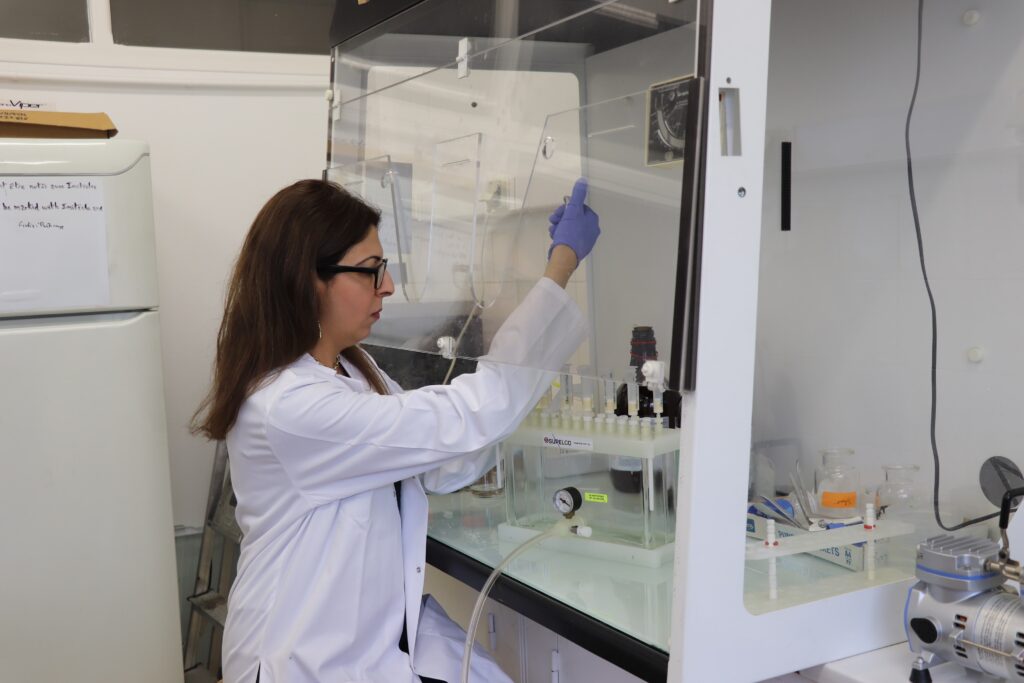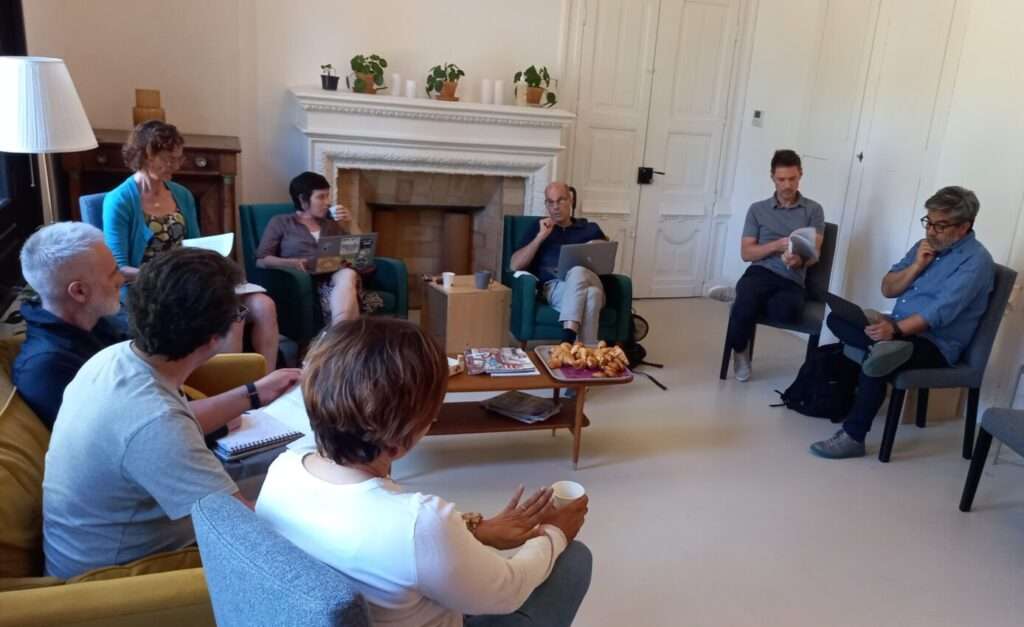10 new international researchers selected as MAK’IT fellows

We are pleased to introduce our fellows who will start their fellowship next semester.
Ten talented fellows from all over the world have now been selected for the MAK’IT fellowship programmes and will have the opportunity to work for several months on innovative research projects on transitions at research institutions in Montpellier (University of Montpellier, CIRAD, CNRS…).
When the new fellows arrive at MAK’IT next semester, they will bring seven novel research projects to Montpellier, exploring a variety of topics related to transitions such as water governance, Green Food Supply Chains, nanomaterials, and coffee production. The ten fellows come from all over the world, from Iran to Brazil, from Australia to Algeria, and from nine different research institutions.
Following an open call for applications for the individual fellowship programmes (Visiting Scientists, FIAS) and the group programme (CAT), MAK’IT has now carefully screened and selected its new fellows.
Six MAK’IT fellows have been selected in the individual international fellowship programme, four in the CAT group that will work on the topic “Controversial tools: researching modelling practices in water governance” (collaborative project, awarded a NetIAS Constructive Advanced Thinking grant, 2021-2024).

Visiting Scientists Fellowships
Every year Montpelier hosts thanks to the ‘Visiting scientists fellowship‘ highly accomplished international researchers and scientists where can find the time, space, and resources to individually and collaboratively explore new research projects while on a sabbatical.
The ‘Visiting scientists’ fellows will be based in research units where they will spend the next few months working on individual projects with Montpellier researchers and becoming an active part of the academic community working on transitions.
Madhur Anand
Dr. Madhur Anand is professor in the School of Environmental Sciences at the University of Guelph (Canada). She an internationally recognized ecologist with research interests ranging from theoretical to empirical studies of natural and human-induced changes in ecosystems at local, regional, and global scales and their implications for sustainability. She has collaborated with mathematicians, theoretical physicists, statisticians, computer scientists, and poets on aspects of ecology and sustainability. Her research program is supported by governmental, industry, national, and international agencies, as well as by a number of awards. Since 2006, she has been based at the University of Guelph and she also was director of the Waterloo Institute for Complexity and Innovation from 2015 to 2018. In 2019, she became the inaugural Director of the Guelph Institute for Environmental Research (GIER), helping to launch a unique and vital cross-disciplinary program helping to “break down barriers among disciplinary silos and bring the arts, the sciences, the humanities, and the engineering together to tackle complex environmental problems”.
She will be working on ‘Structure, Functionality, and Tipping Points in Socio-ecological Systems‘ at the Institute of Evolutionary Science of Montpellier.
George Brown
George G. Brown is a soil ecologist of the Brazilian Agricultural Research Corporation (EMBRAPA), and also teaches in the Graduate Program of Soil Sciences at the Federal University of Paraná. He participates in several international projects including ‘Soil biodiversity and ecosystem function in Human-modified landscapes’. His research project is dedicated to ‘Linking Soil Fauna Communities with Ecosystem Service Provisioning in Rural and Urban Environments‘ and will deepen his ongoing collaboration with the Ecology and Evolutionary Ecology Research Unit. FAUNASERVICES will, for the first time, synthesise the relationships between soil biodiversity – soil macrofauna and earthworm communities – and the provisioning of five key ecosystem services that are critical in Amazonia and the Atlantic Forest, two major biomes in South America.
Silvia Giordani
Prof. Silvia Giordani is Professor of Nanomaterials in the School of Chemical Sciences at Dublin City University (Ireland). She received the prestigious President of Ireland Young Researcher Award in 2007 and was a Research Assistant Professor at TCD from 2007 to 2013. In September 2013 she founded the new “Nano Carbon Materials” research laboratory at the Istituto Italiano di Tecnologia (IIT) and in December 2016 she was appointed Associate Professor of Organic Chemistry at the University of Turin, Italy. She served as Head of the School of Chemical Sciences at DCU from 2020 to 2023.
Her main research interests are in the design, synthesis and characterisation of a wide range of nanomaterials for applications in smart and responsive bio-related nanotechnologies. She will be working on ‘Functional nanomaterials (carbon nano-onions) for health, energy and the environment‘ at the Institute Charles Gerhardt Montpellier.
Mohammad Raayatpanah
Mohammad Ali Raayatpanah is associate professor Department of Mathematical and Computer Sciences at Kharazmi University (Iran). Dr. Raayatpanah is an outstanding researcher in the fields of operations research and distributed computing, with special interest in linear and integer programming applications, network flows theory and algorithms, communication networks, and network coding. Mohammad Ali Raayatpanah received his B.Sc. degree from Kashan University, Esfahan, Iran, in 2004, and the M.Sc. and Ph.D. degrees from Tehran University, Tehran, Iran, in Applied Mathematics, in 2006 and 2013, respectively. His research project is ‘Mathematical Programming and Robust Optimization Techniques for Resilient and Sustainable Green Food Supply Chains‘ at the Laboratory of Computer Science, Robotics and Microelectronics of Montpellier.
FIAS FellowshipS
FIAS awards fellowships to outstanding researchers of all career levels in seven IAS of Aix-Marseille, Loire Valley (Orléans-Tours), Lyon, Montpellier, Nantes, Paris and Rennes. The FIAS fellows will be free to organize their research while benefiting from the support and conducive scientific environment offered by the IAS characterised by a multidisciplinary cohort of fellows and by close relation to the local research units and laboratories.
George Curry
Prof. George Curry is a Geographer at Curtin University (Australia). George’s teaching and research interests are in the areas of Development Studies, migration, rural geography, and research methods. Most of his research has been in rural Papua New Guinea, examining sociocultural and economic change associated with the transition to a market economy. Much of his research is at the household or village level, often involving extended periods of fieldwork. He uses a sustainable livelihoods approach to investigate how export cash cropping and labour migration are accommodated within quasi-subsistence economies, where indigenous relations of production and exchange and communal land tenure are still extant. He will be hosted by Innovation research unit and his research project is on ‘Aligning innovation processes with livelihood and socio-cultural priorities: towards an understanding of the socio-cultural and economic factors that influence innovation adoption in farming households in Papua New Guinea, Africa and Latin America‘.
Mourad Latati
Prof. Mourad Latati is an agro-physiologist at the University of Skikda (Algeria). His main expertise and interest are the development of operational methods for the assessment, exploration and design of cropping systems, both at field and farm levels. The research activities aim to develop and promote agronomic applications resulting from researches on N symbiotic fixation of intercropped legumes with cereals. He is especially interested in the physiological mechanisms implied in improvement of nutrients and water use efficiency. He will work on ‘Assessment of performance and resilience of cereal-legume intercropping system by using the new version of the STICS soil-crop model under contrasted climate conditions‘ and will be hosted by the research unit Agroecology and sustainable intensification of annual crops” (AIDA) and Eco&Sols.
Constructive Advanced Thinking
This European fellowship supports groups of 3-5 people from any discipline, led by an early career researcher, to work on their project for up to 3 years. To enable them to discuss and mature their ideas, the groups will have the opportunity to spend short periods (up to two weeks) in residence at participating institutions, interacting with local residents and research communities.
The next CAT group on ‘Controversial tools: researching modelling practices in water governance‘. They will be in Montpellier in the autumn (7-18 October 2024) in collaboration with G-Eau research unit (Water Management, Actors, Territories).
Rossella Alba
Postdoctoral researcher, the Geography Institute and at the Integrative Research Institute on Transformations of Human-Environment Systems (IRI THESys) of Humboldt University of Berlin.
Rossella Alba is the scientific coordinator of the interdisciplinary project “Water security for whom?” financed by the Volkswagen Foundation. As part of the project, she investigates the role of models and modellers in (re)configuring socio-ecological inequalities and water-food-energy relations in the context of multi-purpose dams in Colombia. She has research interests include environmental justice, (urban) political ecology, socio-technical interactions and in the potentials offered by inter- and trans-disciplinary collaboration to foster critical water geographies and just transformations.
Rozemarijn ter Horst
Lecturer/PhD researcher, the Water Resources Management group at Wageningen University.
Rozemarijn ter Horst researches how technologies, including models and innovations are shaped by, and in turn shape, policy processes related to shared waters. Rozemarijn’s research interests encompass sociotechnical imaginaries, specifically how data and technologies play a role in identifying generally accepted options for development, understanding interactions between lay-people and experts as well as between different disciplines. Before herwork with Wageningen University, Rozemarijn has worked at IHE Delft on water diplomacy, and remains affiliated as Guest Researcher Transboundary Water Governance.
Jonatan Godinez Madrigal
Posdoctoral researcher, IHE Delft Institute for Water Education.
His research consists of studying water conflicts in the Global South with special emphasis on the ripples they originate in other fields of knowledge, such as the scientific objects (i.e. water resources models) that are used to resolve the knowledge controversies that drive the conflicts. He has published numerous scientific papers in high-impact journals on a critical perspective of science-policy processes, water conflicts as drivers of societal transformations, and transdisciplinary production of knowledge to transform water conflicts and socio-technical systems.
Bich Tran
PhD researcher, IHE Delft Institute for Water Education.
She researches uncertainties in evapotranspiration derived from satellite data and how the implication of these uncertainties in water resources assessment. Before her PhD research, Bich worked as a research assistant at IHE Delft on the Water Accounting Plus (WA+) framework, which uses open-access earth observation data and spatially distributed hydrological models for water resources assessment at the basin level. She has conducted several water accounting studies and found interest in the uncertainties of these data, models, and water resources assessments.